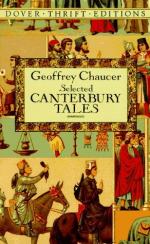|
|
The Canterbury Tales The Merchant's Tale
January, a prosperous knight from Lombardy, finally decided at age sixty to marry, after being convinced by others that paradise on earth is the married life. January's brother, Justinus, tried to convince him otherwise by citing scholarly advice from Tehophrastus who said that men should never wed; servants always show more diligence and respect and certainly never claim as much as a wife does. January responded with several biblical stories of ruined male lives without wives, such as Adam and Eve.
The elderly knight desired a wife younger than thirty, much to Justinus' displeasure, for he warned him that the young, foolish woman could be shrews or drunkards. Although everyone knows that Justinus has a wonderful wife, he knows that she also has her faults. The two brothers quip over marriage benefits and drawbacks, residing on Justinus' prediction that he will not please his wife for more than three years. January decides to marry a young woman, much to everyone's heeding, believing that he would find perfect happiness.
On the night of their wedding, January lusted after his new wife, May, believing his forceful actions to be justified because of their ceremonious union. January's squire, Damian, was also in love with May, however, and wrote a love letter to her that he pinned in a silk purse near his heart. Damian was not with January one day, and all the squires told him that Damian was sick. May and January went to visit the poor squire, where Damian slipped May his love letter. She immediately tore up the note to destroy any evidence of his affection for her. She returned the note with one of her own of pity for him. Damian went into January's prized garden to look for May. It was in this garden that January would often bring his young wife for sexual exploits and romantic endeavors. However, January was now becoming possessive of May, therein giving Damian much heartache.
May had made an extra key to the garden to give to Damian. January entered the garden looking for his wife with lustful urges, when Damian walked in and quickly hid in a tree. As the three were in the garden, the King of Fairies, Pluto, was looking onto the scene with his Queen Proserpina, talking of injustices done by women upon men. They decide to use this love triangle as an example.
Ne se ye nat this honurable knyght,
By cause, allas! that he is blynd and old,
His owene man shal make hym cokewold.
Lo, where he sit, the lechour, in the tree!
Now wol I graunten, of my magestee,
Unto this olde, blynde, worthy knyght
That he shal have ayen his eyen syght,
Whan that his wyf wold doon hym vileynye.
Thanne shal he knowen al hire harlotrye,
Bothe in repreve of hire and othere mo." Merchant's Tale, l.1010-1019
A blind January could not climb the tree in the garden and instead, lifted his wife up into it. While in the tree, she had sex with Damian in front of the blind January. Pluto was enraged and immediately restored January's sight so that he could see his wife's injustice. May denied her actions and convinced January that he must still be blind, for he could never have seen what he believes to have seen, for it simply could never happen. A foolish old knight, January, believed his young wife's story and the tale concludes.




